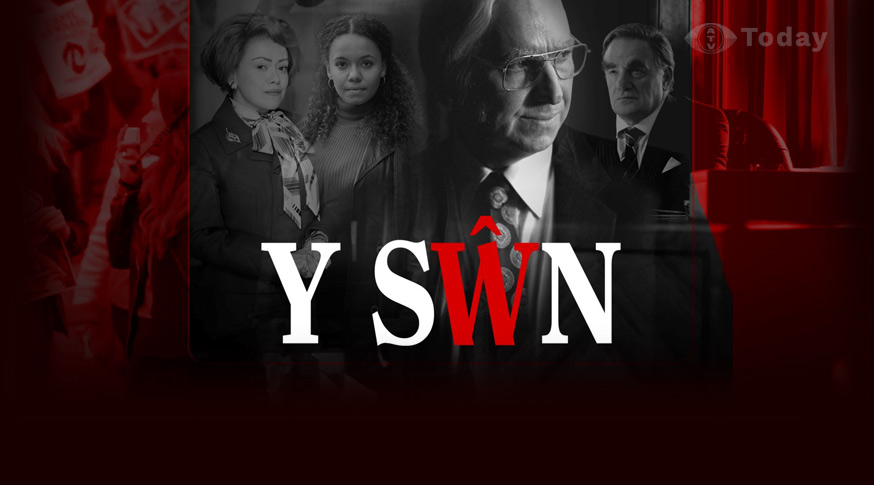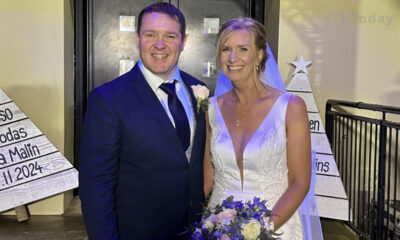The film Y Sŵn has created a stir over the past few weeks by drawing people together and filling cinema seats all over Wales – and beyond. The punky, energetic film written by Roger Williams and directed by Lee Haven Jones tells the story of one of the most important events in the history of Wales in the twentieth century, namely Gwynfor Evans’ stand for the establishment of a Welsh language television channel and his threat to go on hunger strike to ensure that.
Author Roger Williams:
“I enjoy watching dramas by people like James Graham – he specifically makes political history dramas, but his work is about real people and real events that happened quite recently. I’ve been thinking for a while, why don’t we go after those stories?
“S4C was about to celebrate its 40th birthday, and I was interested more than anything else regarding the decisions that were made in Westminster. As a Welsh speaking Welshman I was aware of the story of Gwynfor Evans and Cymdeithas yr Iaith, but didn’t know why the Government had been so reluctant to provide a television channel – so that’s where the journey began for me creatively.”
As well as receiving many glowing reviews, the film has sparked conversations about the influence of protest, the future of broadcasting in Wales and the Welsh language. There will be another opportunity to watch the film on the channel that’s central to its story as it broadcasts on tonight.
Set in 1979 and the turn of the 1980s, Y Sŵn is a feature film inspired by the events that led to the establishment of S4C, the world’s only Welsh language television channel. Margaret Thatcher’s first government was swept to power with a manifesto that included a promise to establish a dedicated Welsh language television channel, only for the Home Secretary, William Whitelaw, to renege on the promise and spark a wave of civil disobedience across Wales.
A key opposition figure was Gwynfor Evans, the leader of Plaid Cymru who vowed to starve himself to death unless the government kept its promise and established the long-awaited channel. The story focuses on three factions – civil servants in the Welsh Office, Welsh nationalists and members of Margaret Thatcher’s first government, and the dramatic scenes are interwoven with archive clips of original news items, protests and interviews from that period.
Among the cast that brings the story to life are several familiar faces to the screen – Rhodri Evan (Gwynfor Evans), Eiry Thomas (Rhiannon, Gwynfor’s wife), Mark Lewis Jones (Willie Whitelaw), Rhodri Meilir (Nicholas Edwards, deputy leader of the Conservatives under Margaret Thatcher), Arwel Gruffydd (Conservative Wyn Roberts), Dafydd Emyr (Labourer Cledwyn Hughes), Sion Eifion (Dafydd Elis-Thomas), Richard Elfyn (Sir Goronwy Daniels), and Sian Reese-Williams (Margaret Thatcher).
As the story interweaves fact and fiction, we see Ceri Samuel – a young woman who is passionate about her Welsh identity who has just started work at the Welsh Office. We follow Ceri and her colleagues as they come to terms with Whitelaw’s decision and as they respond to the protests triggered by the news. Playing the role of Ceri is Lily Beau – the singer who has recently ventured into acting.
“Y Sŵn is a colourful, nostalgic and political film” says Lily. “I had a fairly basic knowledge of what had happened, but it wasn’t until I made the film that I saw how much passion there was behind the campaign, and the extent people fought for the Welsh language. You take the language for granted sometimes, because it comes from school now. The fact that people really fought for what they believed in is an absolute inspiration.”
The idea of telling a slice of history that is relatively unfamiliar to many young Welsh today was the trigger for author Roger Williams:
“It’s interesting that so many people under the age of 45 are unaware of the story, or don’t know much about it, so it is important that we remind people of the sacrifice that was made, especially the sacrifice made by the young members of Cymdeithas yr Iaith who fought for over a decade to secure a Welsh language television channel.
The story is one that hasn’t received enough attention over the years. So I wanted to bring it to a new audience and make them realise that people have fought for the channel and not to take what they gained for granted. I also wanted to make people think about the Welsh language, where we are today, the nature of the channel we have, the service, the platforms we have in Welsh, the way the channel is funded.”
Y Sŵn, tonight at 9pm (9 April) on S4C. English and Welsh subtitles.












